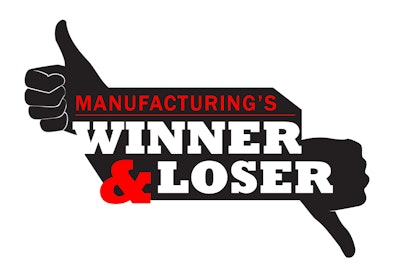
This week we have a group of winners who are working together to address a crucial industry issue — the skills gap. The loser of the week is a company being punished for design changes that compromised the safety of their product.
Winner
This week the winner isn’t singular, but instead four community colleges and six businesses that are coming together to create curriculum for high-demand industries experiencing labor shortages and skill gaps. One industry that is being addressed is manufacturing.
 The initiative is being called, The College Employer Collaborative and was announced on Thursday by the nonprofit group Jobs for the Future and digital learning company CorpU. The schools that will be hosting the course are: Alamo Colleges (Texas), Everett Community College (Washington), LaGuardia Community College (New York) and Neosho County Community College (Kansas).
The initiative is being called, The College Employer Collaborative and was announced on Thursday by the nonprofit group Jobs for the Future and digital learning company CorpU. The schools that will be hosting the course are: Alamo Colleges (Texas), Everett Community College (Washington), LaGuardia Community College (New York) and Neosho County Community College (Kansas).
Initiatives like this are particularly important, and deserve recognition, because it is such a pervasive issue plaguing the industry. According to The Skills Gap in U.S. Manufacturing 2015 and Beyond, 84 percent of executives agree there is a talent shortage in U.S. manufacturing, and six out of ten open skilled production positions remain unfilled because of labor shortages.
The companies helping to create effective curriculums and realistic course work are Boeing, AGCO, MetLife, Guardian, Waddell & Reed and Securian Financial Group. Also, students that successfully complete the courses will receive a credential that is recognized by those companies.
“We hope this collaborative inspires more employers and colleges to invest in similar proactive efforts across the U.S.,” said Jobs for the Future CEO Gina Burkhardt.
READ MORE: Industrial Positioning for Workforce Change, Growth
Loser
On Tuesday, Trinity Industries Inc. was ordered by a federal judge to pay $663 million in damages due to a failure to inform the government about a design change to their highway guardrails, which many believe made them more dangerous.
 The original suit against the company came from a competitor on the behalf of the government. Joshua Harman, the competitor, criticized Trinity by asserting that the new guardrail design turned the safety devices into dangerous spears that could cut through cars. Trinity steadfastly claimed that the guardrails were safe.
The original suit against the company came from a competitor on the behalf of the government. Joshua Harman, the competitor, criticized Trinity by asserting that the new guardrail design turned the safety devices into dangerous spears that could cut through cars. Trinity steadfastly claimed that the guardrails were safe.
However, the jury and judge did not seem to agree. Jurors announced that Trinity should pay at least $175 million. At first U.S. District Court Judge Rodney Gilstrap ordered both sides of the case into mediation, but the groups failed to come to a settlement. After this, on Tuesday, the judge tripled the jury’s fine and added a $138 million dollar penalty citing false claims.
Harman, the whistle-blower on the case, will receive 30 percent of Trinity’s $663 million fine — or $199 million. The judge also said that Harman should receive another $19 million for attorney fees and expenses, increasing Trinity’s fine total to $682 million. The federal government will also be receiving money even though they did not sue Trinity themselves — they will receive $464 million.
"There is no question that Trinity defrauded the federal government and the states when it said this [new design] had been approved and it wasn't approved," said the lawyer, George Carpinello.
Trinity says they will be appealing the decision. "We believe the evidence clearly shows that no fraud was committed," said the Trinity spokesman, Jeff Eller. He expressed the belief that the judge made "significant errors" in applying federal law to Harman's claims.





















